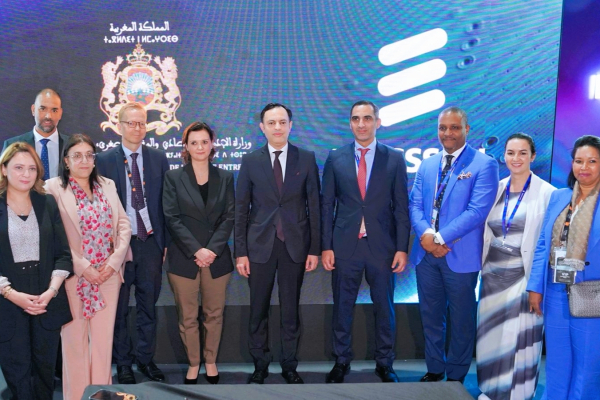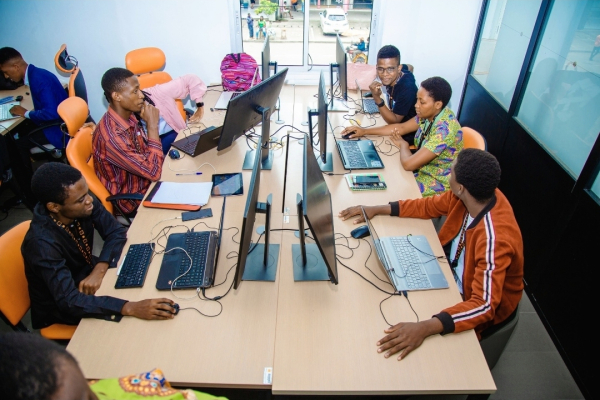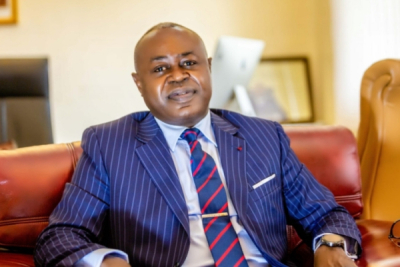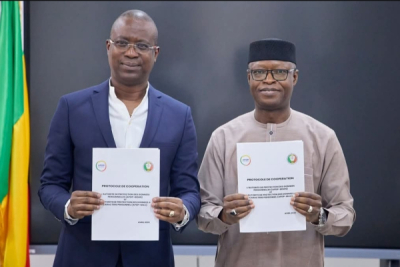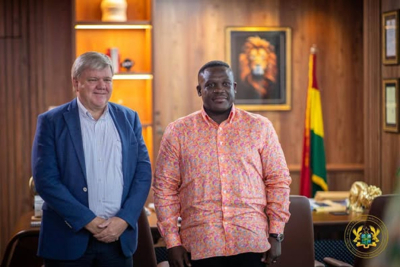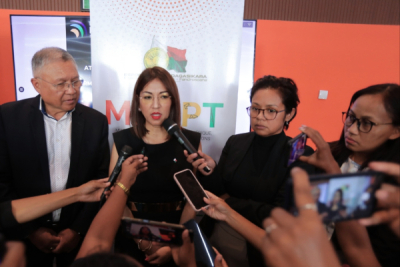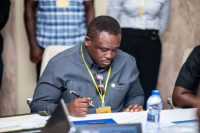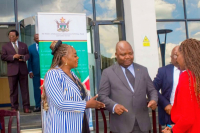
Public Management (593)
Moroccan authorities consider digital technology a key driver of socioeconomic development. This priority spans all sectors, including entrepreneurship.
The Moroccan government and Swedish technology firm Ericsson have announced plans to collaborate on equipping Moroccan entrepreneurs with crucial digital skills. This vision was formalized through the signing of a memorandum of understanding (MoU) on the sidelines of the third edition of Gitex Africa, held in Marrakech from Monday, April 14, to Wednesday, April 16.
Under the MoU, the two entities will explore various ways for Moroccan entrepreneurs and small businesses to leverage Ericsson’s global educational initiatives. A key resource is the Ericsson Educate platform, which offers extensive online learning content covering vital areas such as 5G technology, artificial intelligence (AI), machine learning (ML), the Internet of Things (IoT), automation, cloud computing, and general telecommunications principles.
The overarching goal for the Moroccan government is to furnish entrepreneurs with the “skills in demand for Morocco’s growing digital economy.” This initiative has the potential to align with Axis 2 of the "Morocco Digital 2030" digital transformation strategy, which aims to digitize the nation's economic structure to enhance productivity. Government plans include establishing a foundation for business digitalization, supporting the growth of Moroccan tech small and medium-sized enterprises (SMEs), and aiding micro and small businesses in their own digital transformations. Through widespread digitalization, the government anticipates adding 100 billion dirhams (approximately $10.8 billion) to the national Gross Domestic Product (GDP) by 2030.
However, the article notes that beyond skills acquisition, Moroccan companies may face several hurdles in their digital transition. The Organisation for Economic Co-operation and Development (OECD) has highlighted challenges such as limited internal resources, financial constraints, and restricted access to reliable, fast, and affordable digital infrastructure. The OECD points out that “access to fast broadband, which is essential for businesses to fully leverage digital transformation and harness the potential of advanced applications, remains uneven between urban, rural, and remote areas.”
It is crucial to note that the agreement between the Moroccan government and Ericsson is currently a non-binding memorandum of understanding. This document signifies an intention to collaborate, with specific terms and conditions to be determined through future discussions. The signing of a definitive partnership agreement and the subsequent implementation of planned actions will provide a clearer picture of the potential outcomes and impact of this collaboration.
By Isaac K. Kassouwi,
Editing by Sèna D. B. de Sodji
As the digital economy takes on a more prominent role in global commerce, African nations are working to improve the regulation of digital activity. Senegal is viewing digital taxation as a key tool for asserting its sovereignty and boosting its resources in an era dominated by major online companies.
Senegal collected over one billion CFA francs, equivalent to more than $1.7 million, in 2024 from its recently introduced value-added tax (VAT) on digital services, the country's tax authority announced. Jean Koné, the Director General of Taxes and Domains (DGID), revealed the results on Tuesday, April 15, during the international conference on digital economy taxation in Africa, held in Dakar.
Encouraged by these initial returns, the tax administration intends to intensify its efforts to collect even greater resources in the coming years. "We will implement strategies and innovate to ensure everyone pays the digital VAT. It is also about adapting our system to make it more inclusive and efficient," Koné said. Over the medium term, the government is targeting revenues between 3 and 5 billion CFA francs, with projections reaching as high as 10 billion.
Implemented on July 1, 2024, the tax applies to services provided by both domestic companies and foreign digital platforms operating within Senegal. Unlike a flat tax, the taxable base is calculated from the actual turnover of non-resident providers, based on compensation received or owed. This method more accurately reflects the revenue generated within the Senegalese market.
Senegal's standard VAT rate is set at 18%, with a specific 10% reduced rate for sectors facing difficulties, such as hospitality and restaurants, which were impacted by the COVID-19 pandemic. The tax specifically targets streaming services, software subscriptions (SaaS), cloud computing, online advertising, downloadable games, and paid mobile applications.
While the measure increases state revenues, it also carries implications for consumers. By taxing platforms based on their actual income, the prices of certain digital services could increase, potentially excluding the most vulnerable populations. The key challenge for authorities will be to balance tax efficiency with digital accessibility, ensuring that digital transformation does not come at the cost of inclusion.
By Samira Njoya,
Editing by Sèna D. B. de Sodji
- Congo signs MoU with Russia's Higher School of Economics to boost digital skills training
- Agreement announced at Gitex Africa, focuses on training youth to support nationwide digitization
The Congolese government has secured an agreement for Russian expertise to enhance the digital skills of its population. A memorandum of understanding was signed on Tuesday with Moscow's Higher School of Economics (EHESE) on the sidelines of the third Gitex Africa exhibition, which concludes on Wednesday.
"To train in the digital field, you need access to digital expertise. The purpose of this memorandum is to facilitate the exchange and advancement of expertise to train young Congolese, because the goal is to digitize all spheres of our administration. And when we talk about digitization, if you don’t have the necessary skills, it’s very difficult," Léon Juste Ibombo, Congo's Minister of Posts, Telecommunications and the Digital Economy, told RT television.
The Congolese government has identified digital skills as a cornerstone of its digital transformation strategy, alongside innovation and entrepreneurship. This priority has already led to initiatives such as the establishment of the African Center for Research in Artificial Intelligence (CARIA), with support from the United Nations Economic Commission for Africa (UNECA). In March, Congo also began discussions to join the Give1Project program, an initiative backed by the United Nations Development Programme (UNDP), Microsoft, and France, which aims to train 25,000 young Africans in digital skills. Furthermore, a partnership has been forged with Mohammed VI Polytechnic University, among others.
By prioritizing digital skills training, the Congolese government aims to empower its citizens to actively participate in the burgeoning digital economy and cultivate a skilled workforce capable of addressing both national and regional demands. The World Bank, for instance, projects that nearly 230 million jobs in sub-Saharan Africa will require digital skills by 2030. The Bretton Woods institution estimates Congo's youth unemployment rate at approximately 42%, in a nation where nearly half of the population is under the age of 18.
However, it is important to note that the agreement signed in Marrakech is currently a memorandum of understanding, and the specific terms and a timeline for a formal agreement have not been disclosed. Several key details remain unclear, including the number of beneficiaries, the targeted age groups, the selection criteria for participants, and the precise digital skills that will be taught. Further developments will be necessary to fully evaluate the potential impact and concrete prospects of this nascent partnership.
Isaac K. Kassouwi
- Benin and Mali sign data protection cooperation agreement
- Pact aims to enhance best practice sharing, joint complaint handling, and compliance checks
- Countries to develop shared regulatory standards via technical committees
Benin's Personal Data Protection Authority (APDP) said on Tuesday it signed a cooperation agreement with its counterpart in Mali, seeking closer ties as digital sovereignty issues gain traction in West Africa.
The initiative will foster regular exchanges of best practices and the sharing of operational tools between the two data protection agencies, the APDP announced. The agreement also allows for the joint handling of specific complaints or compliance checks.
Furthermore, Benin and Mali will work towards developing common regulatory standards through dedicated technical committees. They plan to hold joint commissions every two years and organize shared training sessions to enhance the skills of their respective staff.
This collaboration aligns with a broader continental movement spearheaded by the African Network of Personal Data Protection Authorities (RAPDP), which promotes the harmonization of digital regulation across the continent. The move comes as the protection of personal data increasingly becomes a strategic priority for African nations.
According to Africa Cybersecurity Magazine, 37 of the continent's 54 countries now have national laws addressing personal data protection, including both Benin and Mali. However, the effective enforcement of these laws remains a hurdle in several nations.
Through this agreement, Benin and Mali aim to forge a unified approach to the escalating complexities of digital regulation. In a landscape characterized by the cross-border movement of data, the compatibility of legal frameworks is increasingly vital. This partnership could facilitate a more coordinated response to potential threats and help establish a strong foundation of digital trust within West Africa.
By Samira Njoya,
Editing by Sèna D. B. de Sodji
This partnership could help Ghana in its digitalization agenda, improve service delivery, enhance climate resilience, and build a greener, smarter economy. By aligning with a partner like Denmark, Ghana is expanding its capacity to tackle complex development challenges through technology-driven, inclusive solutions.
On April 11, Ghana’s Minister for Communication, Digital Technology and Innovations, Samuel Nartey George, held talks with a Danish Embassy delegation led by Ambassador Tom Norring. The meeting explored opportunities for collaboration in digitalization, innovation, and climate resilience, aiming to strengthen bilateral ties and draw on Denmark’s global expertise in technology and sustainable development.
The meeting highlighted the growing role of Techplomacy—the intersection of technology, diplomacy, and international cooperation—as a driving force in shaping Ghana’s digital future.
Ghana aims to adopt Danish GovTech platforms like cBrain’s F2 and eBoks to improve public service access. The partnership also supports Ghana’s green transition by leveraging Denmark’s expertise in renewable energy and eco-friendly technologies. Denmark’s experience in entrepreneurship and digital startups could help grow Ghana’s local tech industry. Ghana also seeks to collaborate with the Danish Meteorological Institute (DMI) to enhance GMet’s weather forecasting and climate data systems, improving climate resilience and disaster preparedness.
Ghana has made progress in digital governance but still faces key challenges. According to the 2024 UN E-Government Development Index, which measures how effectively governments use digital technologies to deliver public services, Ghana ranks 108th out of 193 countries, highlighting gaps in service delivery, infrastructure, and online access despite ongoing efforts.
In contrast, Denmark ranks 1st, reflecting its leadership in digital public services, strong infrastructure, and high citizen engagement. Ghana’s partnership with Denmark offers a chance to gain technical expertise and insights to build more efficient, inclusive digital systems. Strengthening such collaborations can help Ghana accelerate its digital transformation and improve its global ranking.
This engagement marks a significant step toward future Ghana–Denmark tech cooperation, with potential to deliver long-term benefits across public service delivery, climate resilience, and innovation-led growth.
Hikmatu Bilali
- Madagascar launches $24 million DECIM program to distribute smartphones and boost digital access
- 664,000 devices to be distributed, including 400,000 for women and girls
- Initiative targets increased internet adoption and digital inclusion, especially in remote areas
Last week, the government of Madagascar kicked off a program to distribute digital devices, including smartphones, to its citizens under the $24 million Digital and Energy Connectivity for Inclusion in Madagascar Project (DECIM). The initiative aims to boost internet adoption and the use of digital services nationwide.
According to the CSM Association (GSMA), the inability to afford internet-enabled phones is a major obstacle to technology adoption in areas with existing mobile network coverage. While the GSMA notes that many devices are now priced below $100, this still remains unaffordable for a large segment of the population.
In Madagascar, a $100 smartphone represents nearly 20% of the country’s annual gross national income (GNI) per capita, which the World Bank estimated at $510 in 2023. Even with an average phone lifespan of three years, the cost of acquisition remains substantial, particularly given that many basic needs take precedence.
As part of the initiative, the Malagasy government plans to distribute 664,000 connected digital devices, with 400,000 specifically earmarked for women and girls. The program seeks to reduce disparities in technology access and bolster digital and economic inclusion. A dedicated platform for the “Sale of Digital Devices with Internet Access” will soon be launched, featuring targeted subsidies, a credit line for distributors and financial institutions, a focus on remote areas, and the promotion of mobile money for financial inclusion.
This government effort aligns with broader digital transformation goals outlined in the Digital Strategic Plan (PSN) 2023–2028. Authorities aim to position Madagascar as a key player in Africa’s digital economy by developing telecommunications, e-government services, and digital inclusion. The government is targeting a 6% contribution from the digital sector to GDP by 2028, up from just 1.5% in 2019.
However, smartphone ownership alone does not guarantee internet usage or engagement with digital services, even where network coverage exists. “Among current mobile internet users, many would like to use it more but face a range of barriers to increasing their usage. The main constraints include security concerns, affordability, and connectivity experience. Perceived lack of relevance also plays a role,” the GSMA noted in its State of Mobile Internet Connectivity Report 2024, published in October 2024.
It is important to note that the Malagasy government has not announced any subsequent phases for the program, which remains limited in scope given the country’s estimated population of 31.2 million. In fact, according to the International Telecommunication Union (ITU), approximately 80% of the Malagasy population do not use the internet.
By Isaac K. Kassouwi,
Editing by Sèna D. B. de Sodji
With the upcoming rollout, Ghana is taking a significant step forward in building a more efficient, secure, and inclusive digital ecosystem.
Starting June 2025, SIM card re-registration in Ghana will go fully online, allowing citizens to complete the entire process online—no visits to physical registration centers will be required. The announcement was made on April 8 by Minister for Communication, Samuel Nartey George during a visit to Margins ID Group (Intelligent Card Production Systems) in Accra.
The initiative is part of the government’s broader effort to streamline public services and accelerate the country’s digital transformation. “This system will save time, improve accuracy, and offer a more convenient experience for all Ghanaians,” the Minister noted.
Under the new system, citizens will be able to register their SIM cards using their Ghana Card through a fully online platform, with automatic verification replacing in-person, manual checks.
Ghana’s SIM card re-registration campaign began in 2021, requiring all SIM holders to re-register their numbers using the Ghana Card, the national identity document. However, the process has faced multiple delays due to low registration rates and logistical challenges—including long queues, technical issues, and limited access to registration centers.
According to an update from the Ministry of Communications dated November 11, 2022, and signed by then-Minister Ursula Owusu-Ekuful, 30,011,082 individuals had completed the first phase of registration by linking their Ghana Card to their SIM number. Of these, 20,892,970 had completed the full process, including biometric verification—representing nearly 70% of total registrations at the time.
Despite the progress, millions of SIM cards remained unregistered, prompting repeated deadline extensions and concerns about service disruptions for those unable to complete the process. By moving to a fully online system, the government aims to close the remaining registration gap and reduce the administrative burden for both citizens and telecom operators. The updated system is expected to improve access, boost compliance, and enhance data accuracy.
Beyond convenience, online re-registration is also critical to national goals. The government hopes to strengthen security by curbing fraudulent SIM use and ensuring better regulation of the telecom sector through accurate subscriber data.
Hikmatu Bilali
Gabon has long prioritized digital technology. Building on this foundation, newly elected President Brice Clotaire Oligui Nguema aims to accelerate progress, positioning the nation as a leading African technology hub through ambitious reforms and strategic investments.
Brice Clotaire Oligui Nguema, elected President of Gabon on Sunday after leading the country as Transitional President since the August 2023 military coup, has placed digital development as a key priority in his administration's six-pillar political program.
Oligui Nguema, recognizing digital technology's pivotal role in economic and social development, aims to modernize infrastructure, ensure equitable internet access, and position Gabon as a Central African technology hub.
A central component of his vision is the accelerated deployment of fiber-optic networks nationwide, with the goal of achieving widespread broadband coverage, particularly in underserved rural areas, to bridge the digital divide. He views connectivity as a fundamental right, ensuring all Gabonese citizens, public administrations, and businesses have access to fast, reliable, and affordable internet.
According to DataReportal, Gabon had 1.84 million internet users at the beginning of 2025, representing a 71.9% penetration rate. The government aims to achieve 100% penetration by strengthening infrastructure and ensuring nationwide digital service accessibility.
Building national data centers is also a priority to ensure digital sovereignty. These facilities will store sensitive state data locally and support a dynamic digital ecosystem. The first data center's construction was awarded to Indian company Shapoorji-Pallonji in 2023.
Supporting digital entrepreneurship and local innovation is another key initiative. The presidential program includes innovation hubs and tech incubators, such as the Gabonese Innovation Center, to support startups' growth. Access to financing, public procurement, and business opportunities will be facilitated, alongside modern coworking spaces to foster innovation.
Digitizing public administration is a reform priority. Modernizing institutions like the National Social Security Fund (CNSS) aims to improve service efficiency, enhance transparency in public fund management, and increase user satisfaction. A digital platform for public services is slated for launch in the first half of 2025 to digitize administrative procedures and combat delays and corruption.
This digital strategy is part of a broader state rebuilding effort, focusing on tools to track public spending, stricter project planning and execution, and civil service professionalization. The digital sector has contributed around 5% of Gabon's GDP for nearly five years, and the government aims to double this share through investment, innovation, and job creation.
Regionally, Gabon is a top performer. In 2024, it recorded an ICT adoption index of 74.7 out of 100, according to the International Telecommunication Union (ITU), ranking 10th in Africa. In e-government, it ranks 15th on the continent with a digital government development index of 0.5741, according to the United Nations.
Through this integrated approach, Oligui Nguema seeks to make digital technology a cornerstone of Gabon's renewal, aiming to build a sovereign, innovative, and inclusive tech ecosystem for sustainable growth, youth opportunities, and transparent governance.
Samira Njoya
- Somalia grants operating license to Starlink to expand internet access
- Service aims to improve rural connectivity using low-Earth orbit satellites
Somalia's National Communications Authority (NCA) announced Sunday it has granted an operating license to Starlink, the satellite internet service owned by Elon Musk's SpaceX, aiming to expand internet access, particularly in underserved rural areas.
The NCA believes Starlink's entry will significantly improve connectivity across the country.
"Starlink's entry into Somalia represents a significant milestone in our efforts to bridge the digital divide," said Mustafa Yasin Sheikh, Director General of the NCA, during the license signing ceremony. "This partnership will especially benefit individuals and institutions in rural areas, where internet access has been extremely limited."
Starlink uses a network of low-Earth orbit satellites to deliver internet services, a technology aligned with the GSM Association's (GSMA) recommendations for achieving universal connectivity in sub-Saharan Africa. The GSMA notes that the region's challenging terrain, including rainforests, deserts, and mountains, hinders the deployment of traditional terrestrial networks. "Even in rural and sparsely populated areas, the cost and complexity of deploying traditional mobile or wired networks reinforce the need for alternative connectivity solutions," the GSMA said.
According to the International Telecommunication Union (ITU), nearly half of Somalia's approximately 18.4 million people lacked 4G network coverage in 2023. While 3G and 2G technologies reached 80% and 90% of the population, respectively, the country's overall internet penetration rate stood at only 27.6%.
The potential impact of Starlink on Somalia's digital divide hinges on its affordability. Although specific Somali pricing has not been disclosed, neighboring Kenya offers a potential benchmark: a standard monthly subscription costs 6,500 Kenyan shillings (roughly $50), with a connection kit priced at 49,900 shillings.
If Somalia's pricing mirrors Kenya's, the service could be prohibitively expensive for many Somalis. The $50 monthly fee exceeds Somalia's monthly gross national income (GNI) per capita, estimated at $49.1 by the World Bank. The ITU recommends that monthly internet service expenditures should not exceed 2% of GNI per capita. Currently, Somalis spend an average of 5.3% of per capita GNI on mobile voice and internet services, and up to 80% for fixed internet.
By Isaac K. Kassouwi,
Editing by Sèna D. B. de Sodji
- Zimbabwe launches digital skills program with UAE support to train 1.5 million citizens
- The initiative focuses on programming, AI, data science, and Android development in Kotlin
- Part of Zimbabwe's digital transformation strategy through 2030, it aims to address ICT skill gaps
Zimbabwe's government, with support from the United Arab Emirates, launched a program on Thursday, April 10, to train 1.5 million citizens in programming, aiming to establish "the foundations for a future-focused Zimbabwean workforce skilled in cutting-edge technologies."
The "Zimbabwe Digital Skills Program" will equip participants with key competencies, including data science, programming, Android development in Kotlin, and artificial intelligence.
This initiative aligns with the Zimbabwean government's digital transformation strategy through 2030, which prioritizes skills development and digital capacity building as one of its three core pillars. The government identified a shortage of ICT skills and low digital literacy as significant obstacles to the information and communication technology sector.
"Zimbabwe has a high literacy level and should leverage on this to become a software and hardware development hub. The Government of Zimbabwe intends to increase innovation through promoting local content, heritage and culture applications development," according to the government's master plan.
In August 2024, the government established ties with LinkedIn, focusing on digital skills acquisition for civil servants and youth, particularly through the "LinkedIn Learning" platform.
These initiatives aim to address youth unemployment, a pressing issue for the country. According to the World Bank, approximately 61% of Zimbabwe's population is under 25. However, the country faces high levels of unemployment and underemployment, with a youth unemployment rate of 35% in 2021. The World Bank also estimates that nearly 230 million jobs in sub-Saharan Africa will require digital skills by 2030.
By Isaac K. Kassouwi,
Editing by Sèna D. B. de Sodji
More...
Ghana is accelerating its economy-wide digital transformation. In December 2024, the government initiated a review of its education ICT policy to modernize it and address current sector challenges.
Ghana's Minister of Lands and Natural Resources, Emmanuel Armah-Kofi Buah, emphasized the necessity of digitizing land resource management for increased efficiency during an April 8 visit to the Lands Commission. The $165 million initiative seeks to overhaul a system deemed slow, complex, and vulnerable.
"With my interactions with management of the Commission earlier this morning, I was told that 90% of the Commission’s work is manual. The current system is too slow, cumbersome, and vulnerable. And I believe that digitising the system will speed up surveying and mapping processes, help in locating land quickly, reduce paperwork, and ultimately boost government revenue mobilisation efforts," Buah stated.
The Food and Agriculture Organization of the United Nations (FAO) supports this initiative, asserting that responsible digital transformation of land administration systems can yield substantial benefits. It could invigorate land markets, enhance government land-related revenue, and stimulate economic growth through innovation. It would also strengthen transparency and equity among stakeholders, thus mitigating corruption risks.
This land resource digitization aligns with the Ghanaian government's broader objective to leverage digital technologies for economic growth, public service modernization, and equitable access to digital tools. Digitalization projects are also underway in sectors like education.
However, the $165 million funding requirement poses a potential obstacle to the transformation's implementation. "The infrastructure can be largely invisible, taken for granted, or simply not understood by key decision-makers. To be sustainably maintained, LAS demand systematic, unified, and durable digital transformation plans, that align with each country’s priorities," notes the FAO's 2022 report, "Funding digital transformation of land administration."
By Isaac K. Kassouwi,
Editing by Sèna D. B. de Sodji
- Benin approves digital public procurement system to streamline procedures and improve transparency
- System aims to simplify contract awarding, enhance fairness, and reduce opacity in bidding processes
Benin's government approved the implementation of a digital public procurement system in a Council of Ministers meeting on Wednesday, April 9, aiming to streamline procedures, enhance contract awarding efficiency, and ensure greater transparency in public contract allocations. Revised public procurement regulations will support the new system, with relevant ministers tasked to guarantee its effective application.
"Beyond the irrefutable advantages of technological evolution, the digitalization of public procurement will generate significant gains and progress beneficial to both bidders and contracting authorities," the Council of Ministers stated.
The move aligns with Benin's broader digital transformation efforts. Since 2016, over 1,000 public services have been digitized, with 210 fully dematerialized, allowing citizens to complete administrative tasks online. The Ministry of Digital Affairs and Digitalization has allocated 29.03 billion CFA francs (approximately $48.6 million) for 2025, a 19.3% increase from 2024, to support these modernization initiatives. Further sector modernizations are expected in the coming months.
The digital procurement system is projected to strengthen transparency, simplify processes, and mitigate opaque practices. By automating procedures and centralizing data, it will facilitate bidder access to information, ensure equal treatment among candidates, and reduce ambiguity in bid evaluations. This approach may also shorten procurement timelines, improve decision traceability, and generate budgetary savings. Ultimately, it should enhance contracting authority accountability and foster an environment conducive to investment and competitiveness.
By Samira Njoya,
Editing by Sèna D. B. de Sodji
Despite Nigeria’s thriving tech scene, many skilled professionals struggle to secure jobs. The partnership aims to bridge this gap by connecting rigorously vetted Nigerian tech talents with global opportunities through Doballi’s AI-enabled remote work platform.
The National Information Technology Development Agency (NITDA) has signed a Memorandum of Understanding (MoU) with Afrovision Technologies Limited (Doballi) to create sustainable employment opportunities for Nigerian tech talents.
Doballi’s Country Director, Mrs. Nneoma Ijei, expressed confidence that the collaboration would drive economic advancement and professional growth. She highlighted Nigeria’s potential to lead Africa in the global tech industry, with Doballi positioned at the forefront of this transformation.
Under the agreement, NITDA will provide a steady pipeline of trained tech professionals, ensuring they meet employable standards before onboarding them onto the Doballi platform. Doballi, in turn, will connect these talents with international enterprises, facilitate cross-cultural training, and waive the usual $150 assessment fee for Nigerian applicants.
Additionally, a dedicated dashboard will be created for NITDA to monitor talents’ progress, employer feedback, and foreign currency-based payments into the Nigerian banking system.
NITDA’s Director-General, Kashifu Inuwa Abdullahi, emphasized that the initiative will not only enhance digital job opportunities but also provide valuable data for policymakers.
Nigeria possesses a large and rapidly expanding talent pool with the potential to propel technological progress and digital transformation. A 2022 report by NITDA and ccHub, titled IT Talent Gap Assessment in Nigeria, estimates that about one-third of the population aged 15 to 35 represents a growing group of tech-savvy individuals eager to embrace emerging innovations.
With a significant portion of the youth population being tech-savvy, there is enormous potential for innovation, entrepreneurship, and job creation in the digital economy. However, without adequate job opportunities, training, and infrastructure, this potential could be underutilized, leading to high unemployment and brain drain.
The partnership between NITDA and Doballi is particularly crucial in this context, as it seeks to connect these skilled individuals with global job opportunities, ensuring that Nigeria’s digital workforce is fully integrated into the international tech economy.
By facilitating access to international job markets, the partnership has the potential to significantly reduce unemployment among tech professionals, contribute to economic growth, and position Nigeria as a leading exporter of tech talent on the global stage.
Hikmatu Bilali
- Uganda proposes three-year income tax exemption for startups
- Measure part of 2025 Income Tax Bill aims to boost entrepreneurship and innovation
- Builds on past state initiatives like the National ICT Support Program and Innovation Hub
Ugandan startups may soon receive a three-year income tax exemption aimed at accelerating the nation's startup ecosystem. The measure, part of proposed amendments to the 2025 Income Tax Bill announced last week, seeks to spur entrepreneurship, support small and medium-sized enterprises, and bolster innovation.
The government has previously launched initiatives to support startups, including the National ICT Initiatives Support Program, which helps Ugandan ICT innovators overcome hurdles to entering local and international markets. Additionally, the state established the National ICT Innovation Hub, providing stable internet connectivity and dedicated workspace for tech entrepreneurs.
Private sector efforts, including those by telecom operators and accelerators like Stanbic Business Incubator, Innovation Village, Hive Collab, and Outbox Hub, also contribute to the country’s entrepreneurial growth.
Uganda currently ranks third in East Africa and 95th globally, according to StartupBlink's 2024 "Global Startup Ecosystem Index." Kampala, the capital, holds the 368th position out of 1,000 cities worldwide, and is home to startups such as Tugende, SafeBoda, Numida, and Rocket Health.
StartupBlink, however, recommends diversifying Uganda’s startup ecosystem, which it deems too Kampala-centric. Developing regional hubs would accelerate sector growth, the organization said. It also stressed the need for stronger collaboration among stakeholders to prevent fragmentation that could limit the country’s potential. Furthermore, it advocated for a robust regulatory framework and incentives to attract more investment and stimulate startup growth. National ecosystem investment totaled $10.6 million in 2023, a 60.4% drop from the $26.8 million recorded in 2022.
By Isaac K. Kassouwi,
Editing by Sèna D. B. de Sodji


